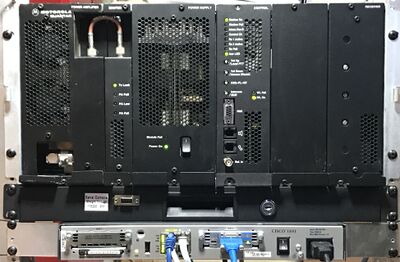Radio Connections: Difference between revisions
imported>Wd6awp |
imported>KB9LFZ m added TKR-820 |
||
| Line 36: | Line 36: | ||
=Kenwood= | =Kenwood= | ||
* TKR720/820 | |||
Connections to: PTT, COS, RX audio out and MIC audio in | |||
=Repeater | TX/RX board, MIC audio input, pins 4 & 5: floating ground, must not tie to any other ground! Some installations may require a 10dB, resistor L-network consisting of a 4.7k and 470 ohm resistors. The 470 ohm resistor connection across pins four and five, the 4.7k resistor is soldered to pin 5 to which your TX audio from the URI will connect to. | ||
The MIC audio gain, deviation, and balance adjustments are *very* sensitive! | |||
- RA-35 without TX adj. trimmer pots: Using a service monitor with deviation metering, start low and work your way up to 3KHz deviation with 1KHz tone, generated by simpleusb-tune-menu. If enabled, *904 turns this tone on and off by command, ie, no tone time-out as in simpleusb-tune-menu. | |||
=Repeater Controller= | |||
[[Media:RTCMwithController.pdf|An example of using RTCMs to replace 420 links]] | [[Media:RTCMwithController.pdf|An example of using RTCMs to replace 420 links]] | ||
Revision as of 17:04, 29 October 2017
Instructions for connecting radios, repeaters AllStarLink interfaces including the RTCM, GPS', URI/URI X and like devices.
GPS
Motorola
CDM
CDMs make great nodes. This eBay reseller has very nice cables. Use to connect to URI or RTCM.
CDM Cable from Kurt Meltzer ex-WB9KNX, now KC4NX - Cable 83 has only one output to use for either COS or CTCSS. Use another cable if you need both COS and CTCSS.
MTR-2000
Quantar
The Quantar can be tricky to interface as it's extremely programmable and you will need a wireline card for I/O connections. By default the I/O will not work unless the "wildcard" table is programed. This wildcard table is Boolean logic of interrupt states in the radio, is extremely flexible and frustrating to debug. It's a base station in it's own class.

Note you will want to use BEW mode on the RTCM if using the RTCM do squelch.
- Another Quantar/RTCM Interface Cable
- Astro-TAC/RTCM Interface Cable
- Interfacing to a Quantar with P25NX - Bryan Fields W9CR has page on interfacing the Qunatar using simple USB into Allstar and P25NX linking at the same time. This is driven by programing on the Quantar Wildcard tables.
- Quantar/URI Cable
- Quantar MRTI/URI Cable
Syntor X
The Motorola Syntor X with an Xcat installed makes a great frequency agile remote base. For more information see this Syntor Xcat page.
VRM-850
Kenwood
- TKR720/820
Connections to: PTT, COS, RX audio out and MIC audio in
TX/RX board, MIC audio input, pins 4 & 5: floating ground, must not tie to any other ground! Some installations may require a 10dB, resistor L-network consisting of a 4.7k and 470 ohm resistors. The 470 ohm resistor connection across pins four and five, the 4.7k resistor is soldered to pin 5 to which your TX audio from the URI will connect to.
The MIC audio gain, deviation, and balance adjustments are *very* sensitive!
- RA-35 without TX adj. trimmer pots: Using a service monitor with deviation metering, start low and work your way up to 3KHz deviation with 1KHz tone, generated by simpleusb-tune-menu. If enabled, *904 turns this tone on and off by command, ie, no tone time-out as in simpleusb-tune-menu.
Repeater Controller
An example of using RTCMs to replace 420 links
Spectra Engineering
- MX800 Base station - Bryan Fields, W9CR has a complete setup guide for the MX800 Base station which includes fallback to the built in controller and an audio delay module.
Tait
URI / URI X
The URI is Manfactured and sold by DMK Engineering.